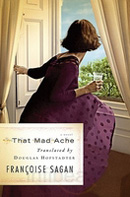

Basic Books, paperback, 9780465010981
That Mad Ache takes us to glamorous 1960s Paris, a world of money, parties and passions.
Lucile, a restless young woman, lives with her older, rich lover Charles. They enjoy a tranquil relationship, he responding to her frequent whims as one might indulge a child, requiring nothing from her beyond her companionship. While Charles may be happy with their sedate, near celibate existence, Lucile is prone to brief, ecstatic affairs that she conceals from Charles. One of these affairs starts at a party, when she meets and falls impetuously and passionately in love with Antoine. Antoine is a poor magazine editor who has been taken up by Diane, a wealthy society woman who secretly worries about her fading looks.
We follow Lucile and Antoine through four seasons from the spring when their love blossoms to the following winter when it begins to die. It's a study of the agonies and the ecstasies of love, from the heights of sexual pleasure to the depths of the pain and humiliation that people can inflict on each other.
They are quite difficult characters to like, both totally self-absorbed, and once the initial flurry of passion starts to fade the realities of their shared life in Antoine's tiny room begin to dawn. I have to admit that while I enjoyed reading their story, both Lucile and Antoine infuriated me so much that I wanted to shake them until their teeth rattled. They are heedless of the hurt they cause Charles and Diane with whom, I have to admit, my sympathies often lay. These two older characters are fascinating. While the focus of the story is on Lucile and Antoine, my thoughts kept coming back to Charles and Diane. I wanted to know why they loved these selfish people and kept coming back to them despite the hurt they caused.
While I don't want to uphold any literary stereotypes, The Mad Ache feels like a French novel—it's
about passion, politics and bourgeoisie poverty. However the wry comments from the narrator remind me of
eighteenth century English novels. Sagan obviously feels affection for her characters, but also uses a dry
wit to highlight their flaws.
